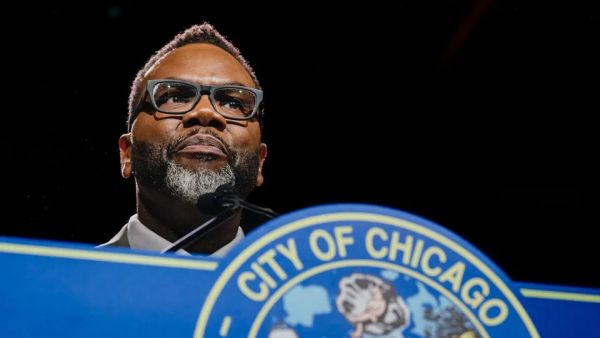Chicago became the largest city in the US to pass a resolution calling for a permanent ceasefire in Gaza, amid the ongoing war of Israel on Gaza that has killed thousands of civilians and displaced millions more.
The resolution, which was approved by a narrow margin of 24-23, with Mayor Brandon Johnson casting the tie-breaking vote, also urged the US government to facilitate a lasting peace in the region and provide humanitarian aid to the war-torn area.
The resolution was met with cheers and applause from hundreds of pro-Palestinian activists who packed the City Hall during the council meeting, as well as praise from people around the world who hailed Johnson as a hero for standing up for human rights and justice. Many social media users expressed their gratitude and admiration for Johnson, using hashtags such as #ThankYouMayorJohnson, #ChicagoStandsWithPalestine, and #GazaNeedsPeace.
Johnson, who is the first African American mayor of Chicago, said he was proud to support the resolution, which he said was a moral duty and a reflection of the city’s values. He said he was moved by the stories of suffering and resilience from the Palestinian community in Chicago, which is one of the largest in the country. He also said he hoped his decision would inspire other leaders to take action and pressure the US government to change its policy on the conflict.
“I believe that Chicago has a responsibility to speak out against injustice and violence wherever they occur, and to stand in solidarity with the oppressed and the marginalized. I believe that the people of Gaza deserve to live in dignity and peace, free from fear and oppression. I believe that the only way to achieve a lasting solution is through dialogue and diplomacy, not bombs and bullets. And I believe that the US has a vital role to play in ending this cycle of bloodshed and bringing hope and stability to the region,” Johnson said in a statement.
The resolution, which was sponsored by Ald. Rossana Rodriguez-Sanchez and co-sponsored by 14 other aldermen, was the result of weeks of intense debate and lobbying from both sides of the issue. The resolution faced strong opposition from some Jewish groups and aldermen, who argued that it was biased, divisive, and irrelevant to the city’s problems.
The resolution’s supporters, however, dismissed these criticisms as baseless and hypocritical, and said that the resolution was a balanced and compassionate response to a humanitarian crisis that has affected millions of people, including many Chicagoans. They also said that the resolution was not anti-Israel or anti-Semitic, but rather pro-peace and pro-humanity, and that it recognized the right of both Israelis and Palestinians to live in safety and harmony.
The resolution comes as the US and other international mediators are trying to broker a ceasefire deal between Israel and Hamas, which have been locked in a deadly war since Hamas launched a surprise attack on Israel on Oct. 7, kidnapping more than 200 people, including several Americans. Israel has responded with a massive military campaign to destroy Hamas’ infrastructure and free the hostages, but has also faced accusations of using excessive force and violating international law. The Israeli aggression on Gaza has has more than 26,000 people, mostly Palestinians, and displaced more than 2 million people, according to the UN.
The resolution also follows a wave of similar resolutions passed by other US cities, such as San Francisco, Los Angeles, Boston, and New York, as well as several European countries, such as France, Germany, and the UK, which have called for an immediate and unconditional ceasefire in Gaza and an end to the Israeli occupation of Palestinian territories. These resolutions have put pressure on the US government, which has been criticized for its unwavering support for Israel and its reluctance to call for a ceasefire, despite the mounting civilian casualties and humanitarian crisis.
The resolution’s passage marks a historic moment for Chicago, which has a long history of activism and social movements, and a diverse and vibrant population that includes many immigrants and refugees from different parts of the world. The resolution also reflects the growing public awareness and sympathy for the Palestinian cause, especially among younger generations and people of color, who have drawn parallels between the struggle for Palestinian liberation and the fight for racial justice and civil rights in the US.






![Turkish series "Ask-ı Memnu" [Forbidden Love]. Turkish series "Ask-ı Memnu" [Forbidden Love].](/sites/default/files/styles/d02_traditional/public/2026-02/%D8%A3%D8%A8%D8%B7%D8%A7%D9%84-%D9%85%D8%B3%D9%84%D8%B3%D9%84-%D8%A7%D9%84%D8%B9%D8%B4%D9%82-%D8%A7%D9%84%D9%85%D9%85%D9%86%D9%88%D8%B9.jpg?h=c673cd1c&itok=nhq8-5rH)
